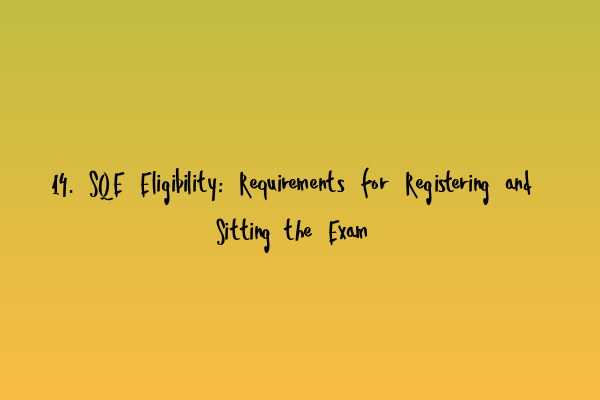SQE Eligibility: Requirements for Registering and Sitting the Exam
Welcome to our comprehensive guide on the requirements for registering and sitting the Solicitors Qualifying Examination (SQE). The SQE is a new licensing examination that will replace the existing Qualified Lawyers Transfer Scheme (QLTS) and the Legal Practice Course (LPC) in England and Wales. Whether you are a law graduate, a non-law graduate, or an overseas qualified lawyer, it is important to understand the eligibility criteria before you embark on your SQE journey.
1. Academic Qualifications
The first requirement for registering for the SQE is to hold a degree or an equivalent qualification. If you are a law graduate, your LLB, BA Law, or any other law degree from a recognized institution will satisfy this requirement. Non-law graduates will need to obtain a Qualifying Law Degree (QLD) or complete a conversion course, such as the Graduate Diploma in Law (GDL), to meet this requirement.
For overseas qualified lawyers, the SRA will assess the equivalence of your qualifications based on their eligibility criteria. It is advisable to check with the SRA or consult a qualified adviser to determine if your qualifications meet the required standards.
Related Article: SQE 1 Preparation Courses
2. English Language Proficiency
The SQE is conducted in English, so all candidates must demonstrate a sufficient level of proficiency in the English language. If English is not your first language, you may need to provide evidence of your language skills by taking an approved English language test. The SRA has specified the acceptable tests and minimum scores required in order to meet this requirement.
It is important to note that exemptions may be available for candidates who have completed their primary and secondary education, as well as their law degree, in English. Again, it is advisable to consult the SRA guidelines or seek advice to determine if you qualify for an exemption.
3. Legal Work Experience
One of the key aspects of the SQE is the requirement for candidates to have gained a minimum period of legal work experience (LWE). The purpose of this requirement is to ensure that candidates have had exposure to the practice of law and have gained hands-on experience in a legal environment.
The SRA has specified that candidates must have completed at least two years of full-time equivalent legal work experience, either before or after taking the SQE. This work experience can be in the form of paid employment, pro bono work, or work-based learning during your legal studies.
Related Article: SQE 2 Preparation Courses
4. Character and Suitability Assessment
As a regulated profession, the legal sector places a high emphasis on character and suitability. All candidates will be required to undergo a character and suitability assessment as part of the SQE registration process. This assessment involves a series of questions about your background, criminal record, financial history, and any regulatory or disciplinary issues.
The purpose of this assessment is to ensure that candidates possess the necessary attributes and qualities to be a competent and ethical solicitor. It is important to provide accurate and honest information during this assessment, as any misrepresentation or failure to disclose relevant information may have implications for your eligibility to register for the SQE.
5. Registration and Exam Fees
Once you have met all the eligibility criteria, you can proceed with the registration process for the SQE. The SRA has set registration fees for both the SQE1 and SQE2 exams, and it is important to pay these fees within the specified deadlines to secure your place.
Please note that the exam fees are separate from the registration fees and are payable closer to the exam dates. It is advisable to familiarize yourself with the SRA’s fee structure and payment deadlines to avoid any issues.
Related Article: SRA SQE Exam Dates
Conclusion
The SQE brings a new approach to qualifying as a solicitor in England and Wales, and it is important to understand and fulfill the eligibility criteria before registering for the exams. By ensuring you meet the academic qualifications, English language proficiency, legal work experience, character and suitability assessment, and paying the required fees, you will be well on your way to becoming a qualified solicitor.
Remember to consult the SRA guidelines, seek advice from qualified professionals, and take advantage of preparatory courses, such as our SQE 1 Preparation Courses and SQE 2 Preparation Courses, to increase your chances of success in the SQE.
